
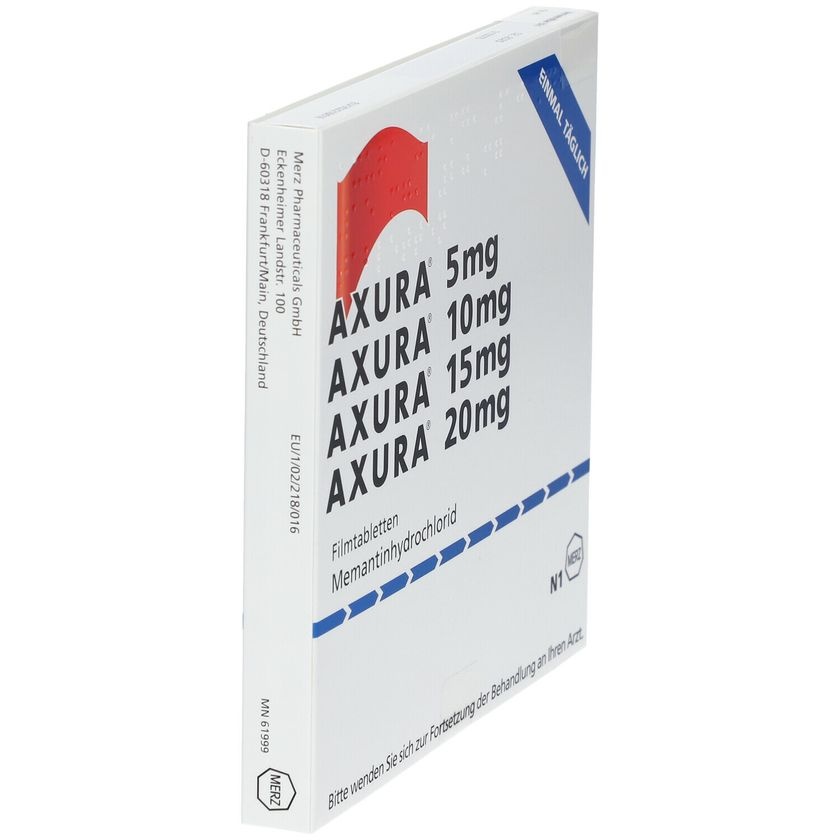
AXURA 5mg+10mg+15mg+20mg COMPRIMIDOS REVESTIDOS POR PELÍCULA Blister (Alu/PP)

Pergunte a um médico sobre a prescrição de AXURA 5mg+10mg+15mg+20mg COMPRIMIDOS REVESTIDOS POR PELÍCULA Blister (Alu/PP)

Como usar AXURA 5mg+10mg+15mg+20mg COMPRIMIDOS REVESTIDOS POR PELÍCULA Blister (Alu/PP)
Introdução
Prospecto: informação para o utilizador
Axura 5 mg comprimidos revestidos com película
Axura 10 mg comprimidos revestidos com película
Axura 15 mg comprimidos revestidos com película
Axura 20 mg comprimidos revestidos com película
Cloridrato de memantina
Leia todo o prospecto atentamente antes de começar a tomar o medicamento porque contém informações importantes para si.
- Conserva este prospecto, pois pode ter que voltar a lê-lo.
- Se tiver alguma dúvida, consulte o seu médico ou farmacêutico.
- Este medicamento foi prescrito apenas para si e não deve dá-lo a outras pessoas, mesmo que tenham os mesmos sintomas que si, pois pode prejudicá-las.
- Se experimentar efeitos adversos, consulte o seu médico ou farmacêutico, mesmo que se trate de efeitos adversos que não aparecem neste prospecto. Ver secção 4.
Conteúdo do prospecto
- O que é Axura e para que é utilizado
- O que precisa saber antes de começar a tomar Axura
- Como tomar Axura
- Possíveis efeitos adversos
- Conservação de Axura
- Conteúdo do envase e informação adicional
1. O que é Axura e para que é utilizado
Como actua Axura
Axura contém o princípio activo cloridrato de memantina.
Axura pertence a um grupo de medicamentos conhecidos como medicamentos anti-demência.
A perda de memória na doença de Alzheimer deve-se a uma alteração nas sinais do cérebro. O cérebro contém os chamados receptores N-metil-D-aspartato (NMDA) que participam na transmissão de sinais nervosos importantes no aprendizado e na memória. Axura pertence ao grupo de medicamentos chamados antagonistas dos receptores NMDA. Axura actua sobre estes receptores melhorando a transmissão das sinais nervosas e a memória.
Para que é utilizado Axura
Axura é utilizado no tratamento de doentes com doença de Alzheimer de moderada a grave.
2. O que precisa saber antes de começar a tomar Axura
Não tome Axura
- se é alérgico (hipersensível) ao cloridrato de memantina ou a qualquer um dos outros componentes dos comprimidos de Axura (ver secção 6).
Advertências e precauções
Consulte o seu médico ou farmacêutico antes de começar a tomar Axura
- se tem antecedentes de crises epilépticas (convulsões)
- se sofreu recentemente um infarto de miocárdio (ataque ao coração), se sofre de doença cardíaca congestiva ou se tem hipertensão não controlada (tensão arterial elevada).
Nas situações anteriores, o tratamento deve ser supervisionado cuidadosamente e o médico deve reavaliar o benefício clínico de Axura regularmente.
Se padece de insuficiência renal (problema de rim), o seu médico deve controlar atentamente a função renal e, se necessário, adaptar as doses de memantina.
Deve evitar o uso de memantina juntamente com outros medicamentos como amantadina (para o tratamento do Parkinson), ketamina (fármaco geralmente usado para produzir anestesia), dextrometorfano (fármaco para o tratamento da tos) e outros antagonistas do NMDA.
Crianças e adolescentes
Não se recomenda o uso de Axura em crianças e adolescentes menores de 18 anos.
Toma de Axura com outros medicamentos
Comunique ao seu médico ou farmacêutico se está utilizando ou utilizou recentemente ou poderia ter que utilizar qualquer outro medicamento.
Em concreto, a administração de Axura pode produzir alterações nos efeitos dos seguintes medicamentos, pelo que pode ser que o seu médico necessite ajustar a dose:
- amantadina, ketamina, dextrometorfano
- dantroleno, baclofeno
- cimetidina, ranitidina, procainamida, quinidina, quinina, nicotina
- hidroclorotiazida (ou qualquer combinação com hidroclorotiazida)
- anticolinérgicos (substâncias geralmente utilizadas para tratar alterações do movimento ou espasmos intestinais)
- anticonvulsivantes (substâncias utilizadas para prevenir e eliminar as convulsões)
- barbitúricos (substâncias geralmente utilizadas para induzir o sono)
- agonistas dopaminérgicos (substâncias como L-dopa, bromocriptina)
- neurolépticos (substâncias utilizadas no tratamento de doenças mentais)
- anticoagulantes orais
Se ingressar num hospital, informe o seu médico que está tomando Axura.
Toma de Axura com alimentos e bebidas
Deve informar o seu médico se mudou recentemente ou tem a intenção de mudar a sua dieta de forma substancial (por exemplo, de dieta normal para dieta vegetariana estrita) ou se padece de acidose tubular renal (ATR, excesso de substâncias produtoras de ácido no sangue devido a uma disfunção renal [problema de rim]) ou infecções graves do trato urinário (conduto da urina), pois o seu médico pode ter que ajustar a dose do medicamento.
Gravidez e amamentação
Se está grávida ou em período de amamentação, acredita que possa estar grávida ou tem intenção de engravidar, consulte o seu médico ou farmacêutico antes de utilizar este medicamento.
Gravidez
Não se recomenda o uso de memantina em mulheres grávidas.
Amamentação
As mulheres que tomam Axura devem suspender a amamentação natural.
Condução e uso de máquinas
O seu médico informá-lo-á se a sua doença lhe permite conduzir e usar máquinas com segurança. Além disso, Axura pode alterar a sua capacidade de reação, pelo que a condução ou o manuseio de máquinas podem resultar inapropriados.
Axura contém sódio
Este medicamento contém menos de 1 mmol de sódio (23 mg) por comprimido; ou seja, a efeitos práticos, está “livre de sódio”.
3. Como tomar Axura
O envase com o tratamento de início de Axura apenas deve ser utilizado no início do tratamento com Axura.
Siga exactamente as instruções de administração deste medicamento indicadas pelo seu médico. Em caso de dúvida, pergunte ao seu médico ou farmacêutico
Posologia
A dose recomendada é de 20 mg por dia, que se alcança mediante incrementos graduais da dose de Axura durante as primeiras 3 semanas de tratamento. O esquema de tratamento também se indica no envase de tratamento de início. Tome um comprimido uma vez por dia.
Semana 1 (dia 1-7):
Tome um comprimido de 5 mg uma vez por dia (de branco a esbranquiçado, fusiforme) durante 7 dias.
Semana 2 (dia 8-14):
Tome um comprimido de 10 mg uma vez por dia (de amarelo pálido a amarelo, forma ovalada) durante 7 dias.
Semana 3 (dia 15-21):
Tome um comprimido de 15 mg uma vez por dia (de laranja pálido a laranja grisáceo e fusiforme) durante 7 dias.
Semana 4 (dia 22-28):
Tome um comprimido de 20 mg uma vez por dia (de vermelho pálido a vermelho grisáceo e fusiforme) durante 7 dias.
semana 1 | comprimido de 5 mg |
semana 2 | comprimido de 10 mg |
semana 3 | comprimido de 15 mg |
semana 4 e seguintes | comprimido de 20 mg uma vez por dia |
Dose de manutenção
A dose diária recomendada é de 20 mg uma vez por dia. Para continuar o tratamento, consulte o seu médico.
Posologia para doentes com insuficiência renal
Se padece de problemas de rim, o seu médico decidirá a dose apropriada para a sua condição. Neste caso, o seu médico deve controlar periodicamente a função renal.
Administração
Axura deve ser administrado por via oral uma vez por dia. Para sacar o máximo proveito da sua medicação, deve tomá-lo todos os dias e à mesma hora. Os comprimidos devem ser engolidos com um pouco de água. Os comprimidos podem ser tomados com ou sem alimentos.
Duração do tratamento
Continue a tomar Axura enquanto for benéfico para si. O médico deve avaliar os efeitos do seu tratamento periodicamente.
Se tomar mais Axura do que devia
- Em geral, tomar uma quantidade excessiva de Axura não deve provocar-lhe qualquer dano. Pode experimentar um aumento dos sintomas descritos na secção 4 “Possíveis efeitos adversos”.
- Se tomar uma sobredose de Axura, contacte o seu médico ou peça conselho médico, pois pode necessitar de atenção médica.
Se esquecer de tomar Axura
- Se se aperceber de que esqueceu de tomar a sua dose de Axura, espere e tome a próxima dose à hora habitual.
- Não tome uma dose dupla para compensar a dose esquecida.
Se tiver alguma outra dúvida sobre o uso deste medicamento, pergunte ao seu médico ou farmacêutico.
4. Possíveis efeitos adversos
Como todos os medicamentos, este medicamento pode produzir efeitos adversos, embora nem todas as pessoas os sofram.
Em geral, os efeitos adversos são classificados de leves a moderados.
Frequentes (podem afectar até 1 em cada 10 pessoas):
- Dor de cabeça, sonolência, constipação, provas da função do fígado elevadas, vertigem, alteração do equilíbrio, falta de ar, tensão alta e hipersensibilidade ao medicamento
Pouco frequentes (podem afectar até 1 em cada 100 pessoas):
- Cansaço, infecções por fungos, confusão, alucinações, vómitos, alteração da marcha, insuficiência cardíaca e formação de coágulos no sistema venoso (trombose/tromboembolismo venoso)
Muito raros (podem afectar até 1 em cada 10.000 pessoas):
- Convulsões
Frequência não conhecida (a frequência não pode ser estimada a partir dos dados disponíveis):
- Inflamação do pâncreas, hepatite (inflamação do fígado) e reações psicóticas
A doença de Alzheimer tem sido relacionada com depressão, ideia suicida e suicídio. Foram relatados casos de ocorrência destes eventos em doentes tratados com Axura.
Comunicação de efeitos adversos
Se experimentar qualquer tipo de efeito adverso, consulte o seu médico ou farmacêutico, mesmo que se trate de possíveis efeitos adversos que não aparecem neste prospecto. Também pode comunicá-los directamente através do sistema nacional de notificação incluído no Anexo V. Mediante a comunicação de efeitos adversos, pode contribuir para fornecer mais informações sobre a segurança deste medicamento.
5. Conservação de Axura
Mantenha fora da vista e do alcance das crianças.
Não utilize este medicamento após a data de validade que aparece no cartão e no blister após CAD. A data de validade é o último dia do mês que se indica.
Este medicamento não requer condições especiais de armazenamento.
Os medicamentos não devem ser deitados fora por os esgotos nem para o lixo. Deposite os envases e os medicamentos que não precisa no Ponto SIGRE da farmácia. Em caso de dúvida, pergunte ao seu farmacêutico como se livrar dos envases e dos medicamentos que não precisa. Desta forma, ajudará a proteger o meio ambiente.
6. Conteúdo do frasco e informação adicional
Composição de Axura
O princípio ativo é cloridrato de memantina.
Cada pulsação do dosificador libera 0,5 ml de solução contendo 5 mg de cloridrato de memantina, equivalente a 4,16 mg de memantina.
Os demais componentes são sorbato potássico, sorbitol E 420 e água purificada.
Aspecto do produto e conteúdo do frasco
Axura, solução oral, é uma solução transparente, de incolora a ligeiramente amarelada.
Axura, solução oral, é apresentada em frascos de 50 ml, 100 ml ou embalagem múltipla com 500 ml (10 x 50 ml).
Pode ser que apenas alguns tamanhos de embalagens sejam comercializados.
Titular da autorização de comercialização
Merz Pharmaceuticals GmbH
Eckenheimer Landstr. 100
D-60318 Frankfurt/Main
Alemanha
Responsável pela fabricação
Merz Pharma GmbH + Co. KGaA
Eckenheimer Landstr. 100
D-60318 Frankfurt/Main
Alemanha
Pode solicitar mais informações sobre este medicamento dirigindo-se ao representante local do titular da autorização de comercialização.
Bélgica Merz Pharmaceuticals GmbH Tel: +49 (0)69 1503 – 0 | Lituânia Merz Pharmaceuticals GmbH Tel: +49 (0)69 1503 – 0 |
Grécia Merz Pharmaceuticals GmbH Tel: +49 (0)69 1503 – 0 | Luxemburgo HANFF Global Health Solutions s.à r.l. Tel: +352 45 07 07-1 |
República Tcheca Merz Pharmaceuticals GmbH Tel: +49 (0)69 1503 – 0 | Hungria Merz Pharmaceuticals GmbH Tel: +49 (0)69 1503 – 0 |
Dinamarca Merz Pharmaceuticals GmbH Tel: +49 (0)69 1503 – 0 | Malta Clinipharm Co. Ltd Tel: +356 21 43 74 15 |
Alemanha Merz Pharmaceuticals GmbH Tel: +49 (0)69 1503 - 0 | Países Baixos Merz Pharmaceuticals GmbH Tel: +49 (0)69 1503 – 0 |
Estônia Merz Pharmaceuticals GmbH Tel: +49 (0)69 1503 – 0 | Noruega Merz Pharmaceuticals GmbH Tel: +49 (0)69 1503 – 0 |
Chipre Merz Pharmaceuticals GmbH Tel: +49 (0)69 1503 - 0 | Áustria Merz Pharma Austria GmbH Tel: +43 1 865 88 95 |
Espanha Merz Therapeutics Iberia, S.L.U. Tel: +34 91 117 89 17 | Polônia Centrala Farmaceutyczna CEFARM SA Tel: +48 22 634 02 22 |
França Merz Pharmaceuticals GmbH Tel: +49 (0)69 1503 – 0 | Portugal Merz Therapeutics Iberia, S.L.U. Tel: +34 91 117 89 17 |
Croácia Merz Pharmaceuticals GmbH Tel: +49 (0)69 1503 – 0 | Romênia Merz Pharmaceuticals GmbH Tel: +49 (0)69 1503 – 0 |
Irlanda Merz Pharmaceuticals GmbH Tel: +49 (0)69 1503 – 0 | Eslovênia Merz Pharmaceuticals GmbH Tel: +49 (0)69 1503 - 0 |
Islândia Merz Pharmaceuticals GmbH Tel: +49 (0)69 1503 – 0 | Eslováquia Merz Pharmaceuticals GmbH Tel: +49 (0)69 1503 – 0 |
Itália Merz Pharmaceuticals GmbH Tel: +49 (0)69 1503 - 0 | Finlândia Merz Pharmaceuticals GmbH Tel: +49 (0)69 1503 – 0 |
Chipre Merz Pharmaceuticals GmbH Tel: +49 (0)69 1503 - 0 | Suécia Merz Pharmaceuticals GmbH Tel: +49 (0)69 1503 – 0 |
Letônia Merz Pharmaceuticals GmbH Tel: +49 (0)69 1503 – 0 | Reino Unido (Irlanda do Norte) Merz Pharmaceuticals GmbH Tel: +49 (0)69 1503 – 0 |
Data da última revisão deste folheto: (MM/AAAA).
A informação detalhada sobre este medicamento está disponível no site da Agência Europeia de Medicamentos: http://www.ema.europa.eu.
Instruções para o uso correto do dosificador
A solução não deve ser vertida ou dispensada diretamente na boca a partir do frasco ou do dosificador. Medir a dose em uma colher ou dentro de um copo de água usando o dosificador.
Retirar a tampa do frasco:
A tampa deve ser girada no sentido contrário ao dos ponteiros do relógio, desrosqueada completamente e retirada (fig. 1).
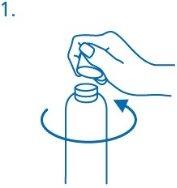
Montagem do dosificador no frasco:
Retirar o dosificador da bolsa de plástico (fig. 2) e colocá-lo sobre o frasco. Introduzir cuidadosamente o tubo de plástico para baixo dentro do frasco. Manter o dosificador no gargalo do frasco e girar no sentido dos ponteiros do relógio até que esteja unido firmemente (fig. 3). O dosificador só deve ser rosqueado uma vez ao iniciar o uso e nunca deve ser desrosqueado.
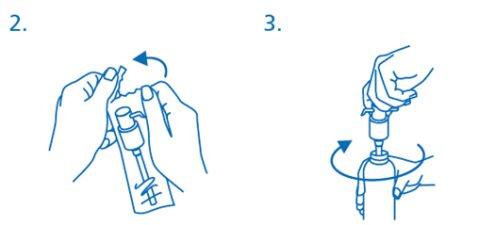
Como funciona o dosificador:
A cabeça do dosificador tem duas posições e gira facilmente
- sentido contrário ao dos ponteiros do relógio para abrir
- sentido dos ponteiros do relógio para fechar.
A cabeça do dosificador não deve ser pressionada para baixo enquanto estiver na posição fechada. A solução só pode ser dispensada na posição aberta. Para abrir, girar a cabeça do dosificador na direção que indica a seta até que não seja possível mais (cerca de um oitavo de giro, fig. 4). O dosificador está então pronto para uso.
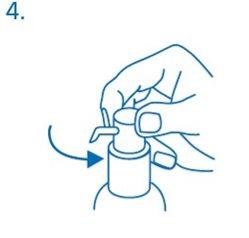
Preparação do dosificador.
Quando utilizado pela primeira vez, o dosificador não dispensa a quantidade correta de solução oral. Portanto, deve ser preparado (carregado) pressionando a cabeça do dosificador para baixo completamente durante cinco vezes seguidas (fig. 5).
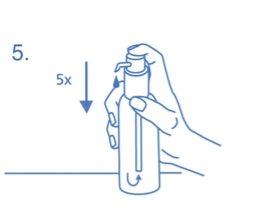
A solução assim dispensada deve ser descartada. Da próxima vez que a cabeça do dosificador for pressionada para baixo completamente (equivalente a uma pulsação), já dispensa a dose correta (fig. 6)
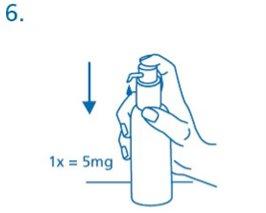
Uso correto do dosificador.
Colocar o frasco em uma superfície plana, horizontal, por exemplo sobre uma mesa, e só deve ser usado em posição vertical. Colocar um copo com um pouco de água ou uma colher debaixo da boquilha. Pressionar a cabeça do dosificador para baixo firmemente mas tranquilamente e de forma sustentada - não muito devagar (fig. 7, fig. 8).
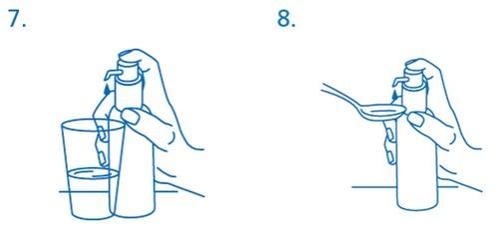
A cabeça pode então ser solta e está pronta para a próxima pulsação.
O dosificador deve ser usado apenas com Axura solução em frasco fornecido, não para outros produtos ou embalagens. Se o dosificador não funcionar corretamente, consulte seu médico ou farmacêutico. Feche o dosificador após usar Axura.
- País de registo
- Substância ativa
- Requer receita médicaSim
- Fabricante
- Esta informação é apenas para referência e não constitui aconselhamento médico. Consulte sempre um médico antes de tomar qualquer medicamento. A Oladoctor não se responsabiliza por decisões médicas baseadas neste conteúdo.
- Alternativas a AXURA 5mg+10mg+15mg+20mg COMPRIMIDOS REVESTIDOS POR PELÍCULA Blister (Alu/PP)Forma farmacêutica: COMPRIMIDO, 10 mgSubstância ativa: memantineFabricante: Merz Pharmaceuticals GmbhRequer receita médicaForma farmacêutica: COMPRIMIDO, 10 mgSubstância ativa: memantineFabricante: Merz Pharmaceuticals GmbhRequer receita médicaForma farmacêutica: COMPRIMIDO, 20 mgSubstância ativa: memantineFabricante: Merz Pharmaceuticals GmbhRequer receita médica
Alternativas a AXURA 5mg+10mg+15mg+20mg COMPRIMIDOS REVESTIDOS POR PELÍCULA Blister (Alu/PP) noutros países
As melhores alternativas com o mesmo princípio ativo e efeito terapêutico.
Alternativa a AXURA 5mg+10mg+15mg+20mg COMPRIMIDOS REVESTIDOS POR PELÍCULA Blister (Alu/PP) em Polónia
Alternativa a AXURA 5mg+10mg+15mg+20mg COMPRIMIDOS REVESTIDOS POR PELÍCULA Blister (Alu/PP) em Ukraine
Médicos online para AXURA 5mg+10mg+15mg+20mg COMPRIMIDOS REVESTIDOS POR PELÍCULA Blister (Alu/PP)
Avaliação de posologia, efeitos secundários, interações, contraindicações e renovação da receita de AXURA 5mg+10mg+15mg+20mg COMPRIMIDOS REVESTIDOS POR PELÍCULA Blister (Alu/PP) – sujeita a avaliação médica e regras locais.













